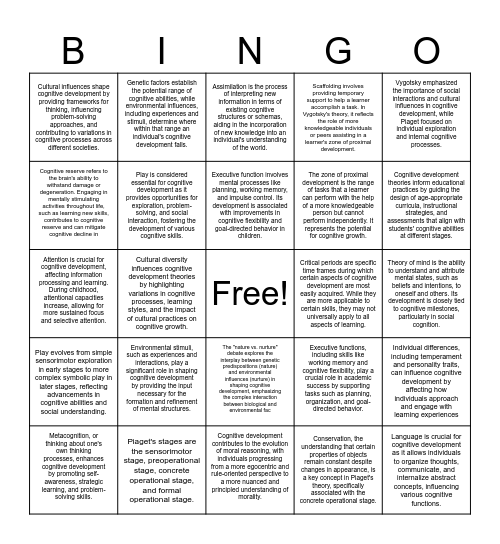

This bingo card has a free space and 30 words: Cognitive development refers to the growth and maturation of mental processes such as thinking, memory, problem-solving, and language acquisition throughout the lifespan., Piaget's stages are the sensorimotor stage, preoperational stage, concrete operational stage, and formal operational stage., Assimilation is the process of interpreting new information in terms of existing cognitive structures or schemas, aiding in the incorporation of new knowledge into an individual's understanding of the world., Object permanence is the understanding that objects continue to exist even when they are not visible. It is significant because it marks a key milestone in a child's cognitive development, typically emerging in the sensorimotor stage., Vygotsky emphasized the importance of social interactions and cultural influences in cognitive development, while Piaget focused on individual exploration and internal cognitive processes., Cultural influences shape cognitive development by providing frameworks for thinking, influencing problem-solving approaches, and contributing to variations in cognitive processes across different societies., Play is considered essential for cognitive development as it provides opportunities for exploration, problem-solving, and social interaction, fostering the development of various cognitive skills., Executive function involves mental processes like planning, working memory, and impulse control. Its development is associated with improvements in cognitive flexibility and goal-directed behavior in children., The zone of proximal development is the range of tasks that a learner can perform with the help of a more knowledgeable person but cannot perform independently. It represents the potential for cognitive growth., Language is crucial for cognitive development as it allows individuals to organize thoughts, communicate, and internalize abstract concepts, influencing various cognitive functions., Metacognition, or thinking about one's own thinking processes, enhances cognitive development by promoting self-awareness, strategic learning, and problem-solving skills., Environmental stimuli, such as experiences and interactions, play a significant role in shaping cognitive development by providing the input necessary for the formation and refinement of mental structures., Conservation, the understanding that certain properties of objects remain constant despite changes in appearance, is a key concept in Piaget's theory, specifically associated with the concrete operational stage., Technology can influence cognitive development by providing new avenues for learning, altering information processing, and shaping the development of digital literacy skills., Play evolves from simple sensorimotor exploration in early stages to more complex symbolic play in later stages, reflecting advancements in cognitive abilities and social understanding., Cognitive development and creativity are interconnected, as cognitive advances provide the foundation for creative thinking, problem-solving, and the generation of novel ideas., Cognitive development contributes to the evolution of moral reasoning, with individuals progressing from a more egocentric and rule-oriented perspective to a more nuanced and principled understanding of morality., Critical periods are specific time frames during which certain aspects of cognitive development are most easily acquired. While they are more applicable to certain skills, they may not universally apply to all aspects of learning., Individual differences, including temperament and personality traits, can influence cognitive development by affecting how individuals approach and engage with learning experiences, Cognitive reserve refers to the brain's ability to withstand damage or degeneration. Engaging in mentally stimulating activities throughout life, such as learning new skills, contributes to cognitive reserve and can mitigate cognitive decline in, Cultural diversity influences cognitive development theories by highlighting variations in cognitive processes, learning styles, and the impact of cultural practices on cognitive growth., Problem-solving involves processes such as recognizing problems, generating solutions, and evaluating outcomes. These processes evolve with age, becoming more systematic and flexible., Scaffolding involves providing temporary support to help a learner accomplish a task. In Vygotsky's theory, it reflects the role of more knowledgeable individuals or peers assisting in a learner's zone of proximal development., Theory of mind is the ability to understand and attribute mental states, such as beliefs and intentions, to oneself and others. Its development is closely tied to cognitive milestones, particularly in social cognition., Attention is crucial for cognitive development, affecting information processing and learning. During childhood, attentional capacities increase, allowing for more sustained focus and selective attention., Genetic factors establish the potential range of cognitive abilities, while environmental influences, including experiences and stimuli, determine where within that range an individual's cognitive development falls., The "nature vs. nurture" debate explores the interplay between genetic predispositions (nature) and environmental influences (nurture) in shaping cognitive development, emphasizing the complex interaction between biological and environmental fac, Executive functions, including skills like working memory and cognitive flexibility, play a crucial role in academic success by supporting tasks such as planning, organization, and goal-directed behavior., Cognitive development theories inform educational practices by guiding the design of age-appropriate curricula, instructional strategies, and assessments that align with students' cognitive abilities at different stages. and Cognitive development shapes the way individuals process information, interpret experiences, and form beliefs and attitudes. As cognitive abilities mature, individuals develop more complex and nuanced perspectives..
Educational Presentation Bingo | Congnitive & Creativity in Early Childhood | Brain Buster | Naturing Cognitive & Creative | Child Development Theorists Review
Share this URL with your players:
For more control of your online game, create a clone of this card first.
Learn how to conduct a bingo game.
With players vying for a you'll have to call about __ items before someone wins. There's a __% chance that a lucky player would win after calling __ items.
Tip: If you want your game to last longer (on average), add more unique words/images to it.